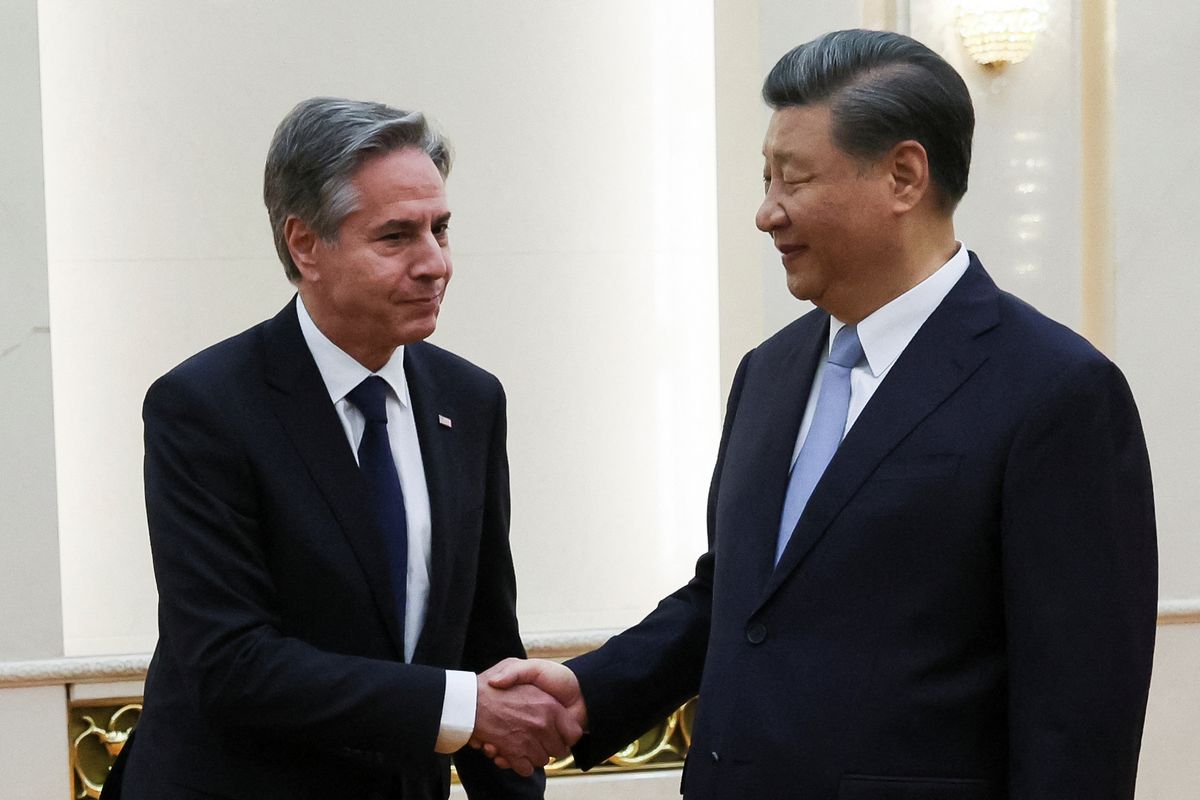Blinken and Xi discuss the path to better US-China communication
China and the US – things have been getting heated between these two global powerhouses, and tensions have been on the rise.

A few minutes every morning is all you need.
Stay up to date on the world's Headlines and Human Stories. It's fun, it's factual, it's fluff-free.
The backstory: China and the US – things have been getting heated between these two global powerhouses, and tensions have been on the rise. You see, there are a bunch of issues that have been causing this friction. First off, Beijing's close ties with Moscow have raised some eyebrows in Washington. The US is also trying to put a limit on selling advanced technologies to China, which has added fuel to the fire. Both US President Joe Biden and his predecessor, Donald Trump, have made it clear that they see China as a threat to America's long-term dominance on the global stage.
Despite promising to have more frequent communication, Biden and China's President Xi Jinping haven't been on the best of terms lately. Things have actually gone downhill since their last meeting at the G20 summit in Indonesia last November. First, there were some words and visits exchanged that showed the two maybe weren’t seeing eye to eye on the Taiwan question. Then, in February, an alleged Chinese surveillance balloon flew into US airspace, hovering over some highly-sensitive military sites. The US ended up shooting it down, and right after, Secretary of State Antony Blinken's planned visit to China was canceled. There have also been some recent hostile encounters between the two in the Taiwan Strait.
More recently: Blinken’s trip was rescheduled, and he headed to Beijing over the weekend. He's the first US cabinet official to visit China since 2018, and it's also his first trip to China under the Biden administration. Prior to the meeting with Xi, Blinken engaged in extensive discussions with China's top diplomat, Wang Yi, and held lengthy talks (over seven hours) with China's foreign minister, Qin Gang. Wang emphasized that the China-US relationship is critical, urging the US to choose between dialogue, confrontation, cooperation or conflict. He attributed the current state of affairs to the US' misconceptions about China.
The development: Blinken and Xi met on Monday. The meeting, which lasted about 35 minutes, was confirmed publicly just about an hour before it happened. Reports say the discussions were positive, with Blinken and Xi having a handshake at the Great Hall of the People, which is the go-to place usually reserved for greeting heads of state. Biden also said the talks were good on Monday, saying, “We’re on the right trail here.”
The main purpose was to tackle the increasing tensions between the two countries and let cooler heads prevail. There are still a few things to sort out, but Blinken expressed optimism about better communication and engagement going forward. But it's important to note that they didn't restore military-to-military communications between the two countries during the talks, with China pointing to US sanctions as an obstacle.
During their conversation, Blinken brought up concerns about China's actions in the Taiwan Strait and the South and East China Seas. Basically, he made it clear where the US stands on those matters, while confirming that the US stance on Taiwan hasn’t changed. He also raised the issues of human rights with the Chinese leader. On another note, they discussed cracking down on the flow of chemicals used in making fentanyl, which is a big problem in the US that has killed thousands in overdoses. They even mentioned possibly forming a working group to tackle this issue head-on.
Xi reportedly told Blinken that China wasn’t looking to replace the US and that the country respected US interests, but China wanted the same sort of respect in return. He expressed that the world needs relations between the two to be stable.
Key comments:
“I came to Beijing to strengthen high-level channels of communication, to make clear our positions and intentions in areas of disagreement, and to explore areas where we might work together on our interests, align on shared transnational challenges, and we did all of that,” said US Secretary of State Antony Blinken.
“We are for de-risking and diversifying. That means investing in our own capacities and in secure, resilient supply chains, pushing for level playing fields for our workers and our companies, defending against harmful trade practices and protecting our critical technologies so that they aren’t used against us,” said Blinken.
“We do not support Taiwan independence. We remain opposed to any unilateral changes to the status quo by either side. We continue to expect the peaceful resolution of cross-strait differences,” said Blinken.
“China respects the interests of the United States and will not challenge or replace the United States. Similarly, the United States must also respect China and not harm China’s legitimate rights and interests,” said Chinese President Xi Jinping, according to a readout.
“Both sides agreed on follow-on senior engagements in Washington and Beijing to continue open lines of communication,” according to the US State Department.
“We’re on the right trail here,” US President Joe Biden said Monday, adding that Blinken “did a hell of job” during his trip to Beijing.




Comments ()